- Home
- Josephine Tey
To Love and Be Wise
To Love and Be Wise Read online
ONE
Grant paused with his foot on the lowest step, and listened to the shrieking from the floor above. As well as the shrieks there was a dull continuous roar; an elemental sound, like a forest fire or a river in spate. As his reluctant legs bore him upwards he arrived at the inevitable deduction: the party was being a success.
He was not going to the party. Literary sherry parties, even distinguished ones, were not Grant's cup of tea. He was going to collect Marta Hallard and take her out to dinner. Policemen, it is true, do not normally take out to dinner leading actresses who gravitate between the Haymarket and the Old Vic; not even when the policemen are Detective-Inspectors at Scotland Yard. There were three reasons for his privileged position, and Grant was aware of all three. In the first place he was a presentable escort, in the second place he could afford to dine at Laurent's, and in the third place Marta Hallard did not find it easy to obtain escort. For all her standing, and her chic, men were a little afraid of Marta. So when Grant, a mere Detective-Sergeant then, appeared in her life over a matter of stolen jewellery, she had seen to it that he did not entirely fade out of it again. And Grant had been glad to stay. If he was useful to Marta as a cavalier when she needed one, she was even more useful to him as a window on the world. The more windows on the world a policeman has the better he is likely to be at his job, and Marta was Grant's "leper's squint" on the theatre.
The roar of the party's success came flooding out through the open doors on to the landing, and Grant paused to look at the yelling crowd asparagus-packed into the long Georgian room and to wonder how he was going to pry Marta out of it.
Just inside the door, baffled apparently by the solid wall of talking and drinking humanity, was a young man, looking lost. He still had his hat in his hand, and had therefore just arrived.
"In difficulties?" Grant said, catching his eye.
"I've forgotten my megaphone," the young man said.
He said it in a gentle drawl, not bothering to compete with the crowd. The mere difference in pitch made the words more audible than if he had shouted. Grant glanced at him again, approvingly. He was a very good-looking young man indeed, now that he took notice. Too blond to be entirely English. Norwegian, perhaps?
Or American. There was something in the way he said "forgotten" that was transatlantic.
The early spring afternoon was already blue against the windows and the lamps were lit. Across the haze of cigarette smoke Grant could see Marta at the far end of the room listening to Tullis the playwright telling her about his royalties. He did not have to hear what Tullis was talking about to know that he was talking about his royalties; that is all Tullis ever talked about.
Tullís could tell you, off-hand, what the Number Two company of his Supper for Three took on Easter Monday in Blackpool in 1938. Marta had given up even a pretence of listening, and her mouth drooped at the corners. Grant thought that if that D.B.E, did not come along soon Marta would be disappointed into the need for a face-lifting. He decided to stay where he was until he could catch her eye. They were both tall enough to see over the heads of a normal crowd.
With a policeman's ingrained habit of inspection he let his eye run over the crowd between them, but found nothing of interest. It was the usual collection. The very prosperous firm of Ross and Cromarty were celebrating the publication of Lavinia Fitch's twenty-first book, and since it was largely due to Lavinia that the firm was prosperous the drinks were plentiful and the guests were distinguished. Distinguished in the sense of being well-dressed and well-known, that is to say. The distinguished in achievement did not celebrate the birth of Maureen's Lover, nor drink the sherry of Messrs Ross and Cromarty. Even Marta, that inevitable Dame, was here because she was a neighbour of Lavinia's in the country. And Marta, bless her black-and-white chic and her disgruntled look, was the nearest thing to real distinction in the room.
Unless, of course, this young man whom he did not know brought more than good looks to the party. He wondered what the stranger did for a living. An actor? But an actor would not stand baffled at the edge of a crowd. And there was something in the implied comment of his remark about the megaphone, in the detachment with which he was watching the scene, that divorced him from his surroundings. Was it possible, Grant wondered, that those cheekbones were being wasted in a stockbroker's office? Or was it perhaps that the soft light of Messrs Ross and Cromarty's expensive lamps flattered that nice straight nose and the straight blond hair and that the young man was less beautiful in the daylight?
"Perhaps you can tell me," said the young man, still not raising his voice in emulation, "which is Miss Lavinia Fitch?"
Lavinia was the sandy little woman by the middle window. She had bought herself a fashionable hat for the occasion, but had done nothing to accommodate it; so that the hat perched on her bird's-nest of ginger hair as if it had dropped there from an upper window as she walked along the street. She was wearing her normal expression of pleased bewilderment and no make-up.
Grant pointed her out to the young man.
"Stranger in town?" he said, borrowing a phrase from all good Westerns. The polite formality of "Miss Lavinia Fitch" could have come only from the U.S.A.
"I'm really looking for Miss Fitch's nephew. I looked him up in the book and he isn't there, but I hoped he'd be here. Do you happen to know him, Mr.—?"
"Grant."
"Mr. Grant?"
"I know him by sight, but he isn't here. Walter Whitmore, you mean?"
"Yes. Whitmore. I don't know him at all, but I want very much to meet him because we have—had, I mean —a great friend in common. I was sure he'd be here. You're quite sure he isn't? After all, it's quite a party."
"He isn't in this room; I know that, because Whit-more is as tall as I am. But he may still be around somewhere. Look, you had better come and meet Miss Fitch. I suppose we can get through the barricade if we have the determination."
"You lean and I'll squirm," said the young man, referring to their respective build. "This is very kind of you, Mr. Grant," he said as they came up for air halfway, wedged tightly together between the hedged elbows and shoulders of their fellows; and he laughed up at the helpless Grant. And Grant was suddenly disconcerted. So disconcerted that he turned immediately and continued his struggle through the jungle to the clearing at the middle window where Lavinia Fitch was standing.
"Miss Fitch," he said, "here is a young man who wants to meet you. He is trying to get in touch with your nephew."
"With Walter?" said Lavinia, her peaked little face losing its muzzy expression of general benevolence and sharpening to real interest.
"My name is Searle, Miss Fitch. I'm over from the States on holiday and I wanted to meet Walter because Cooney Wiggin was a friend of mine too."
"Cooney! You are a friend of Cooney's? Oh, Walter will be delighted, my dear, simply delighted. Oh, what a nice surprise in the middle of this—I mean, so unexpected. Walter will be pleased. Searle, did you say?"
"Yes. Leslie Searle. I couldn't find Walter in the book—"
"No, he has just a pied-a-terre in town. He lives down at Salcott St. Mary like the rest of us. Where he has the farm, you know. The farm he broadcasts about. At least it's my farm but he runs it and talks about it and—. He's broadcasting this afternoon, that is why he isn't coming to the party. But you must come down and stay. Come down this weekend. Come back with us this afternoon."
"But you don't know if Walter—M "You don't have any engagements for the weekend, do you?"
"No. No, I haven't. But—"
"Well, then. Walter is going straight back from the studio, but you can come with Liz and me in our car and we'll surprise him. Liz! Liz, dear, where are you? Where are you staying, Mr. Searle?" "I'm at the Westmorla
nd." "Well, what could be handier. Liz! Where is Liz?" "Here, Aunt Lavinia."
"Liz, dear, this is Leslie Searle, who is coming back with us for the weekend. He wants to meet Walter because they were both friends of Cooney's. And this is Friday, and we are all going to be at Salcott over the weekend recovering from this—being nice and quiet and peaceful, so what could be more appropriate. So, Liz dear, you take him round to the Westmorland and help him pack and then come back for me, will you? By that time this—the party will surely be over, and you can pick me up and well go back to Salcott together and surprise Walter."
Grant saw the interest in the young man's face as he looked at Liz Garrowby, and wondered a little. Liz was a small plain girl with a sallow face. True, she had remarkable eyes; speed-well blue and surprising; and she had the kind of face a man might want to live with; she was a nice girl, Liz. But she was not the type of girl at whom young men look with instant attention. Perhaps it was just that Searle had heard rumors of her engagement, and was identifying her as Walter Whitmore's fiancée.
He lost interest in the Fitch ménage as he saw that Marta had spotted him. He indicated that he would meet her at the door, and plunged once more into the suffocating depths. Marta, being the more ruthless of the two, did the double distance in half the time and was waiting for him in the doorway.
"Who is the beautiful young man?" she asked, looking backwards as they moved to the stairs.
"He came looking for Walter Whitmore. He says he's a friend of Cooney Wiggin."
"Says?" repeated Marta, being caustic not about the young man but about Grant.
"The police mind," Grant said apologetically.
"And who is Cooney Wiggin, anyhow?"
"Cooney was one of the best-known press photographers in the States. He was killed while photographing one of those Balkan flare-ups a year or two ago."
"You know everything, don't you."
It was on the tip of Grant's tongue to say: "Anyone but an actress would have known that," but he liked Marta. Instead he said: "He is going down to Salcott for the weekend, I understand."
"The beautiful young man? Well, well. I hope Lavinia knows what she is doing."
"What is wrong with having him down?"
"I don't know, but it seems to me to be taking risks with their luck."
"Luck?"
"Everything has worked out the way they wanted it to, hasn't it? Walter saved from Marguerite Merriam and settling down to marry Liz; all family together in the old homestead and too cosy for words. No time to go introducing disconcertingly beautiful young men into the ménage, it seems to me."
"Disconcerting," murmured Grant, wondering again what had disconcerted him about Searle. Mere good looks could not have been responsible. Policemen are not impressed by good looks.
"I wager that Emma takes one look at him and gets him out of the house directly after breakfast on Monday morning," Marta said. "Her darling Liz is going to marry Walter, and nothing is going to stop that if Emma has anything to do with it"
"Liz Garrowby doesn't look very impressionable to me. I don't see why Mrs. Garrowby should worry."
"Don't you indeed. That boy was making an impression on me in thirty seconds flat and a range of twenty yards, and I'm considered practically incombustible. Besides, I never believed that Liz really fell in love with that stick. She just wanted to bind up his broken heart."
"Was it badly broken?"
"Considerably shaken, I should say. Naturally."
"Did you ever act with Marguerite Merriam?"
"Oh, yes. More than once. We were together for quite a lengthy run in Walk in Darkness. There's a taxi coming."
"Taxi! What did you think of her?"
"Marguerite? Oh, she was mad, of course."
"How mad?"
"Ten tenths."
"In what way?”
"You mean how did it take her? Oh, a complete indifference to everything but the thing she wanted at the moment."
"That isn't madness; that is merely the criminal mind at its simplest."
"Well, you ought to know, my dear. Perhaps she was a criminal manqué. What is quite certain is that she was as mad as a hatter and I wouldn't wish even Walter Whitmore a fate like being married to her."
"Why do you dislike the British Public's bright boy so much?"
"My dear, I hate the way he yearns. It was bad enough when he was yearning over the thyme on an Aegean hillside with the bullets zipping past his ears— he never failed to let us hear the bullets: I always suspected that he did it by cracking a whip—"
"Marta, you shock me."
"I don't, my dear; not one little bit. You know as well as I do. When we were all being shot at, Walter took care that he was safe in a nice fuggy office fifty feet underground. Then when it was once more unique to be in danger, up comes Walter from his little safe office and sits himself on a thymey hillside with a microphone and a whip to make bullet noises with."
"I see that I shall have to bail you out, one of these days."
"Homicide?"
"No; criminal libel."
"Do you need bail for that? I thought it was one of those nice gentlemanly things that you are just summonsed for."
Grant thought how independable Marta's ignorances were.
"It might still be homicide, though," Marta said, in the cooing, considering voice that was her trade-mark on the stage. "I could just stand the thyme and the bullets, but now that he has taken a ninety-nine years' lease of the spring corn, and the woodpeckers, and things, he amounts to a public menace."
"Why do you listen to him?"
"Well, there's a dreadful fascination about it, you know. One thinks: Well, that's the absolute sky-limit of awfulness, than which nothing could be worse. And so next week you listen to see if it really can be worse. It's a snare. It's so awful that you can't even switch off. You wait fascinated for the next piece of awfulness, and the next. And you are still there when he signs off."
"It couldn't be, could it, Marta, that this is mere professional jealousy?"
"Are you suggesting that the creature is a professional?" asked Marta, dropping her voice a perfect fifth, so that it quivered with the reflection of repertory years, and provincial digs, and Sunday trains, and dreary auditions in cold dark theatres.
"No, I'm suggesting that he is an actor. A quite natural and unconscious actor, who has made himself a household word in a few years without doing any noticeable work to that end. I could forgive you for not liking that. What did Marguerite find so wonderful about him?"
"I can tell you that. His devotion. Marguerite liked picking the wings off flies. Walter would let her take him to pieces and then come back for more."
"There was one time that he didn't come back.”
"Yes."
"What was the final row about, do you know?"
"I don't think there was one. I think he just told her he was through. At least that is what he said at the inquest. Did you read the obituaries, by the way?"
"I suppose I must have at the time. I don't remember them individually."
"If she had lived another ten years she would have got a tiny par in among the 'ads' on the back page. As it was she got better notices than Duse. 'A flame of genius has gone out and the world is the poorer.” She had the lightness of a blown leaf and the grace of a willow in the wind.' That sort of thing. One was surprised that there were no black edges in the Press. The mourning was practically of national dimensions."
"It's a far cry from that to Liz Garrowby."
"Dear, nice Liz. If Marguerite Merriam was too bad even for Walter Whitmore, then Liz is too good for him. Much too good for him. I should be delighted if the beautiful young man took her from under his nose."
"Somehow I can't see your 'beautiful young man' in the role of husband, whereas Walter will make a very good one."
"My good man, Walter will broadcast about it. All about their children, and the shelves he has put up in the pantry, and how the little woman's bulbs are comi
ng along, and the frost patterns on the nursery window. She'd be much safer with—what did you say his name was?"
"Searle. Leslie Searle." Absentmindedly he watched the pale yellow neon signature of Laurent s coming nearer. "I don't think safe is the adjective I would apply to Searle, somehow," he said reflectively; and from that moment forgot all about Leslie Searle until the day when he was sent down to Salcott St. Mary to search for the young man's body.
TWO
"Daylight!" said Liz, coming out on the pavement. "Good clean daylight." She sniffed the afternoon air with pleasure. "The car is round the corner in the square. Do you know London well, Mr.—Mr. Searle?"
"I've been in England for holidays quite often, yes. Not often as early in the year as this, though."
"You haven't seen England at all unless you have seen it in the spring."
"So I've heard."
"Did you fly over?"
"Just from Paris like a good American. Paris is fine in the spring too."
"So I've heard," she said, returning his phrase and his tone. And then, finding the eye he turned on her intimidating, went on: "Are you a journalist? Is that how you knew Cooney Wiggin?"
"No, I'm in the same line as Cooney was."
"Press photography?"
"Not Press. Just photography. I spent most of the winter on the Coast, doing people."
"The Coast?"
"California. That keeps me on good terms with my bank manager. And the other half of the year I travel and photograph the things I want to photograph."
"It sounds a good sort of life," Liz said, as she unlocked the car door and got in.
"It's a very good life."
The car was a two-seater Rolls; a little old-fashioned in shape as Rolls cars, which last for ever, are apt to be. Liz explained it as they drove out of the square into the stream of the late afternoon traffic.
"The first thing Aunt Lavinia did when she made money was to buy herself a sable scarf. She had always thought a sable scarf the last word in good dressing. And the second thing she wanted was a Rolls. She got that with her next book. She never wore the scarf at all because she said it was a dreadful nuisance to have something dangling about her all the time, but the Rolls was a great success so we still have it"

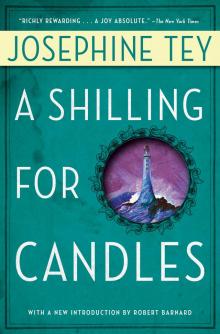 A Shilling for Candles
A Shilling for Candles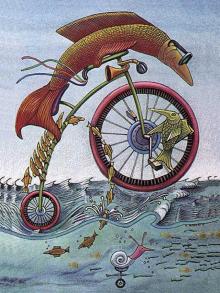 The Singing Sands
The Singing Sands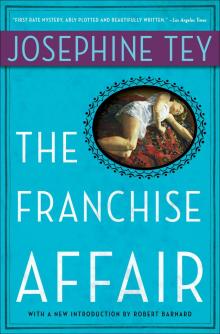 The Franchise Affair
The Franchise Affair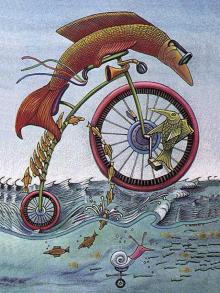 Daughter of Time
Daughter of Time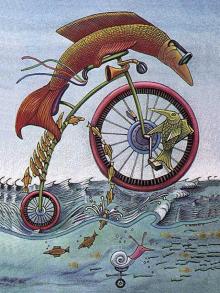 To Love and Be Wise
To Love and Be Wise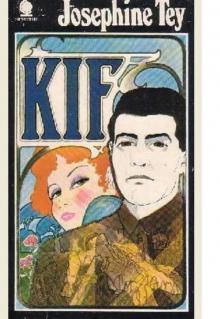 Kif
Kif The Expensive Halo: A Fable Without Moral
The Expensive Halo: A Fable Without Moral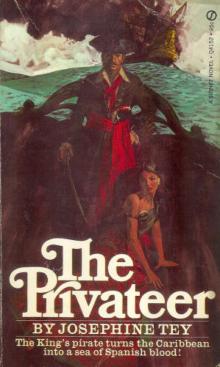 The Privateer
The Privateer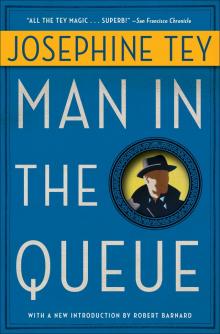 The Man in the Queue
The Man in the Queue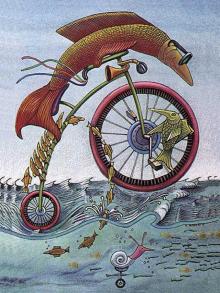 Miss Pym Disposes
Miss Pym Disposes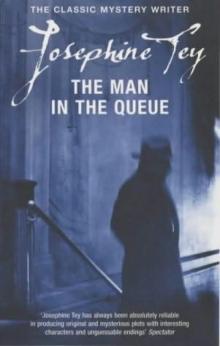 The Man in the Queue ag-1
The Man in the Queue ag-1 Brat Farrar
Brat Farrar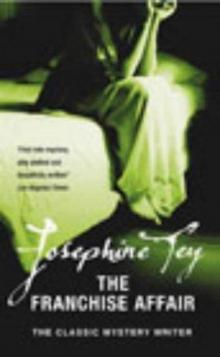 The Franchise Affair ag-3
The Franchise Affair ag-3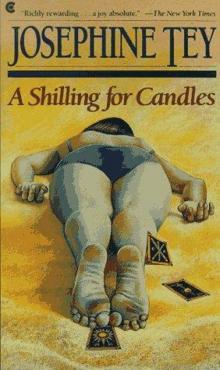 A Shilling for Candles ag-2
A Shilling for Candles ag-2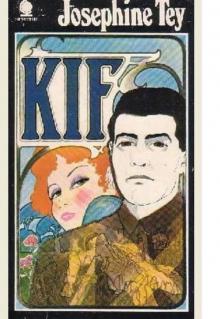 Kif: An Unvarnished History
Kif: An Unvarnished History The Expensive Halo
The Expensive Halo The Singing Sands ag-6
The Singing Sands ag-6 To Love and Be Wise ag-4
To Love and Be Wise ag-4